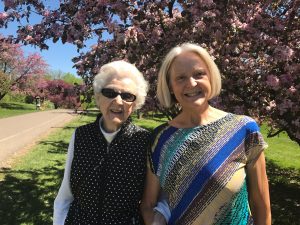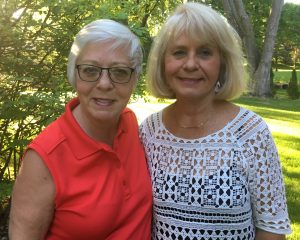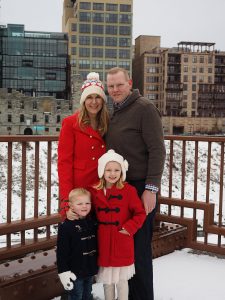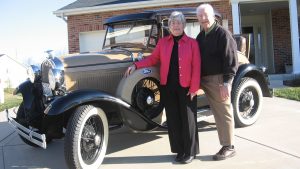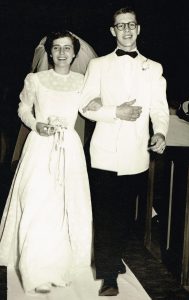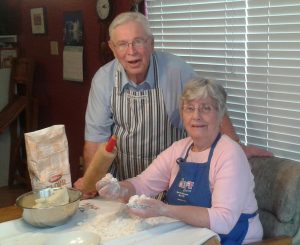Paul and LaVonne (both ’63) Batalden’s commitment to endow Augsburg University faculty with future opportunities has deep roots—three generations deep, in fact—and a spiritual foundation grounded in lives well-lived.
Paul’s grandfather, a fisherman who grew up just off the west coast of Norway and lost a brother at sea, decided in 1871 to move to Minnesota and take up farming. His name was Christian Olson, a name so common that his mail often wound up in the wrong hands, prompting him to change it to Batalden, after the island where he grew up. That first Batalden, an active supporter of education and child development, took special note of Augsburg Seminarium, which Norwegian Lutherans had founded in Marshall, Wisconsin, in 1869 and moved to Minneapolis in 1872. His youngest son, Abner Batalden, enrolled there and, despite some interruptions, earned a history degree in 1935.
Abner, Paul’s father, was also committed to education and understood the struggle it involved. “He was going to school during the Depression, when Augsburg was having trouble staying open. The students, many of whom were the first generation to attend college, were living hand-to-mouth, working and paying tuition. Augsburg was living on those tuitions,” says Paul.
Abner started the student employment service at Augsburg, worked at the publishing house, managed the bookstore, and, after a few years away, returned to take a position in the development office. He helped raise funds for the first science building, now being replaced by the Hagfors Center for Science, Business, and Religion; Paul remembers going to the dedication as a child. It was Abner’s idea to establish, in 1980, a convocation and lecture series known as the Batalden Symposium on Applied Ethics.
“Applied ethics covers every discipline, every walk of life. It was the way he lived his life,” says Paul. “Ethics scholars say that ethics is the application of morals to everyday life. In his mind, the life he lived was grounded in moral values, which for him were Christian. It was so fundamental, and he saw it in many lines of work.”
“Ethics were looked upon as a philosophical endeavor, but he saw it as much broader,” adds LaVonne, who married Paul three weeks after graduation. The two had met in a freshman English class and shared a love for science. After a globe-spanning career in pediatrics and public health that expanded their knowledge of other cultures, Paul remains active as professor emeritus at the Dartmouth Institute for Health Policy and Clinical Practice, Geisel School of Medicine, and LaVonne retired recently as associate professor of natural sciences at Colby-Sawyer College in New Hampshire. They still travel widely but now live in St. Paul, close to their family.
Although they had initially wanted to endow an ethics chair, they realized that building upon Abner’s foundation would serve more people. Along with Paul’s brother, Stephan Batalden ’67 and his wife Sandra, they have endowed what is now the Batalden Faculty Scholar Program in Applied Ethics, which covers the seminar series and also offers two years of release time to faculty members, who often pass along stipends to students involved in their projects. Recipients come from various fields, so far including nursing, sociology, religion, and environmental studies.
“It’s perfect. Paul’s father had a vision for the future, and we have brought it into the 21st century,” says LaVonne. “What pleases us is that it maintains the idea of service grounded in theology and ethics, and we have broadened that.”
Paul, who served on Augsburg’s Board of Regents from 1979 to 1990, cites his concern for education’s future in our culture, which depends heavily on the voluntary sector, unlike government supported health and welfare in Europe. Colleges cannot rely on tuitions alone, and religious institutions can no longer bridge the gap.
“We realized that Augsburg had basically no endowment, and it’s clear that that pattern of financial support would not lead to more creative and flexible programming. We want to make sure that this program is secure,” Paul says. “College offered us a liberal arts education, and we are deep lovers of the liberal arts. We see their relevance to everyday life the same way my father saw ethics in everyday life.”
The couple also believes in doing what you can. They cite a favorite poem by David Whyte, quoted here in part:
Start close in,
don’t take the second step
or the third,
start with the first
thing
close in,
the step
you don’t want to take. . .
. . .
Start right now
take a small step
you can call your own
don’t follow
someone else’s
heroics, be humble
and focused,
start close in . . .

